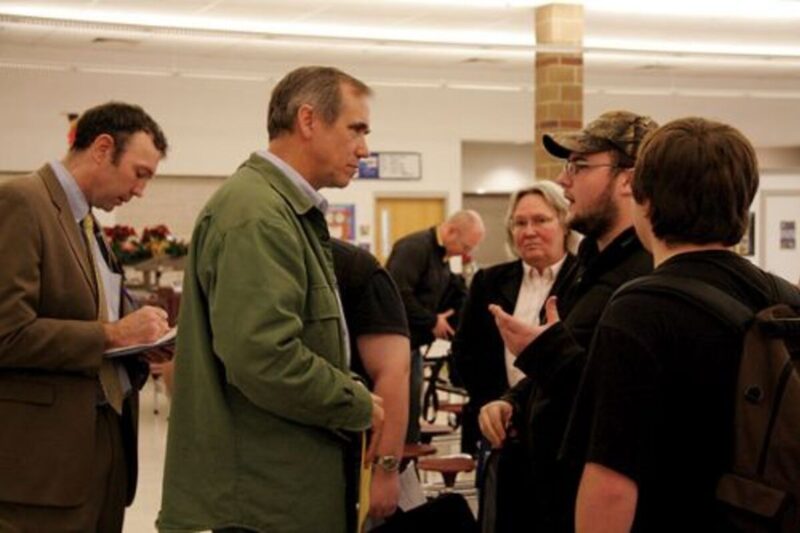Scott Swanson
Sen. Jeff Merkley made history Tuesday, Jan. 8, with a somewhat spur-of-the-moment visit to Sweet Home – the first by a U.S. Senator in at least a decade.
The visit, which was announced late the previous week, was in question, Merkley and aides said, due to congressional action to avert the “fiscal cliff” by Dec. 31.
Merkley said his appearance in Sweet Home was a continuation of the pledge he made when elected of holding a town hall at least once a year in every county in Oregon. His Sweet Home visit was his 147th in the four years he has served and his fifth in Linn County, following a stop in Tangent last year.
Introduced as “the son of a millwright” by Mayor Craig Fentiman, Merkley spoke to a crowd of approximately 75 people, including many high school students, in the Sweet Home High School Cafeteria, Merkley answered questions and explained his views of various current issues ranging from logging to the “fiscal cliff” to what he called the “paralysis” he sees in Congress.
SEN. JEFF MERKLEY speaks to students and community members at Sweet Home High School Tuesday, Jan. 8.
Fiscal Cliff
Speaking of the last minute aversion of “the dramatic decrease in spending and dramatic increase in revenue (taxes) that would have taken place on Jan. 1,” Merkley noted the “irony is many of us have been calling for an increase in revenue and decrease in spending, but this was so dramatic it would have sent our economy back into recession.”
He criticized the “last-minute” nature of the deal as “not an example of how Congress should operate,” but said it includes some good and some bad.
On the positive side, it extended unemployment benefits for 40,000 Oregon families and staved off looming cuts in Medicare reimbursements to doctors, saving benefits for elderly Oregonians.
The downside was that Congress did little to fix the nation’s financial quandary, he said, pointing out that the deficit ceiling and individual appropriation bills will be on the table in March. Also, sequestration cuts agreed to in budget legislation passed a year and a half ago will land on working families, he said.
“What this package didn’t do was put us on a course where we can say we have stability and where we know where we are headed,” Merkley said.
Describing the “big picture on government spending and revenue,” he said the last time the budget was balanced, government income was about 20 percent of the nation’s gross domestic product.
“Now we’re raising 15 percent, so revenues have dropped 5 percent, and we’re spending 23 percent; that’s opened up this 8 percent gap and that’s this annual deficit that we’re all concerned about. We need a steady pathway to close that gap and that steady pathway can’t be smoke and mirrors.”
Merkley blamed the wars in Iraq and Afghanistan, along with the “so-called Bush Tax Cuts,” along with the “collapse of the economy from the mortgage fiasco (that) put the icing on the cake” for the decreased revenues and debt that the nation faces.
“If we steadily close that over the next six or eight years, we will have a reliable pathway to bring our deficit back under control,” he said. “But if we don’t, we’re going to see this ongoing challenge of essentially creating a debt that is passed on to our children.”
Congressional Gridlock
Merkley said the filibuster, a parliamentary procedure dating back to ancient times in which an individual legislator can extend debate on an issue and thus delay or entirely prevent a vote on a proposal, is “paralyzing” the Senate.
He said the idea is that everyone needs to have their say, and prior to the 1970s, filibusters were used legitimately to further debate issues. Then, he said, minority party members on both sides of the aisle began using the strategy to kill bills.
In six years as leader of the Senate, he said, Lyndon B. Johnson faced one filibuster. Current Senate leader Harry Reid has faced 391 in six years.
“That’s paralysis,” Merkley said, adding that each filibuster creates a delay of at least a week before an issue is voted on and the public is not aware, frequently, that a filibuster has taken place.
Also, “people object to a vote and vote for more debate, then take off. That’s typical.
“I am leading the battle in the Senate to create a talking filibuster – if you vote for more debate, you actually have to debate. It’s as simple as that. If you don’t, a simple majority cloture vote would be in order.”
One result, he said, is that the Senate and House have “essentially lost the ability to hold conference committees.
“That’s outrageous. The Senate has passed a bill, the House has passed the same bill, they have different versions. They need to sit down and negotiate the differences. And we can’t get to that negotiation without a three-way paralysis of the Senate. Therefore we don’t do those conferences.”
The real issue, he said, is “transparency and accountability before the public.
“If you vote for more debate and you actually have to debate, it means you have to spend time and energy – whereas you don’t have to spend any time and energy now to obstruct the Senate.”
Deficit Spending and
the Debt Ceiling
In response to a question on the subject from SHHS senior Candalyn Johnson, Merkley likened America’s debt situation to paying a credit card bill. Citing Ronald Reagan, who, he said, was a steadfast advocate of maintaining a strong credit rating, “these are bills we’ve incurred. We’ve got to pay the bill.
“We can debate future spending, but we do not compromise our good faith and credit. The reason (Reagan) felt so strongly about it was because it’s like shooting yourselves in the foot. If you don’t pay your credit card bill, your credit rating goes down and you pay more in interest.”
Merkley said the U.S. dodged a bullet when its credit rating was downgraded because that move did not have as big an impact on its ability to borrow money as feared.
“The reason it didn’t cause a complete catastrophe was that the rest of world was in financial chaos as well. And, by comparison, the U.S. is fairly stable.”
He said threatening not to pay “is absolutely a mistaken strategy because we just shoot ourselves in the foot.”
Illegal Immigration
Responding to a question from SHHS senior Josh Pickett about his stand on immigration, Merkley said that the issue has been “argued about since I was in college and the country hasn’t come to terms with it.”
While border security has been greatly improved, he said, “the bigger issue is folks overstaying their visas and the fact that employment is the attraction.
“If you don’t have a system in which you have a framework of law for employment, whether you’re here in the country legally to work, you still have large illegal immigration problem.
“Meanwhile, we have a very low number of legal visa permits. There are industries and areas where more immigration might be helpful to our economy.
“We have challenges on both sides. How are you going to address the fact that there are 11 million folks in this country who are in kind of a shadow legal status?”
Domestic vs. Foreign Spending
Verde Frazier of Cascadia cited 26-U.S.-run hospitals in Iraq, “servicing 6,000 patients a day, free” and “billions” of aid dollars spent in Africa. “Yet Washington wants to stop Social Security, wants to reduce Medicare and Medicaid. Taking stuff away from our own people and giving it to others. That’s wrong.”
Merkley responded that he’s been “immersed” in an effort to get the U.S. out of Iraq and Afghanistan and the Senate recently approved his amendment “which calls for bringing our sons and daughters home.
“We’re spending $120 billion a year in Afghanistan. If that was enhancing our national security, that would be one thing but it isn’t.
“We need to shift our emphasis. We’ve been doing a lot of nation-building abroad. We need to do a lot of our nation building here at home.”
He said “billions” could be saved domestically by bargaining for drugs, as the Veterans Administration does, for Medicare programs and he said he opposes suggestions that the age for Medicare eligibility be raised, calling that a “death sentence” for some seniors.
Cascadia Post Office
Merkley said after the questions that although he’s been able to save 47 Oregon rural Post Offices that were slated to close, the U.S. Postal Service is not cooperating with his efforts to get a new Post Office to replace the one in Cascadia that burned down in late 2011.
“The National Post Office is stiff-arming us right now,” he said.
A collaboration of community members, along with people from his staff and Congressman Peter DeFazio’s are “pushing back,” he said.
“This is a straightforward building and they keep throwing up excuses. In terms of a small town, the post office plays such an important role in terms of efficiency of economy. It’s a huge waste for people to have to drive a substantial distance to pick up their mail. Locked post office boxes don’t serve the same role in providing communication point in community. “I’m going to keep pushing on this. The Post Office is resisting any time they can. They are shutting down. I largely won the battle over the 41 that were slated for closure, but because the post office is running red ink, they are making it hard. I was just telling a member of the community maybe we need to get together and build a building and say ‘Here it is.’”
He said a key step has been to get the Cascadia Post Office incorporated into the community forest project that is being addressed by the Governor’s Special Projects Program Team.
Forests’ Future
In response to an inquiry from SHHS senior Nate Melcher regarding his stance on forests, Merkley recounted how his father was a millwright in Douglas County before losing his job when the company he worked for was purchased by an investor and shut down overnight.
“Like so many small towns, that dramatically changed our lives and our neighbors’,” he said.
Merkley called the condition of the state’s forests a “lose-lose.”
“It’s a situation where we have so much second-growth forest that’s overly dense, subject to disease, subject to fires. It’s not getting harvested. We’re kind of paralyzed there. The result is we don’t have jobs and we don’t have healthier forests.”
He said Oregon “is starting to take steps in the right direction” with “dozens” of stewardship forests in which, “essentially, groups that used to oppose each other have come together to work out local plans for harvest and that’s important because it’s kept the issue out of the courts, which is beautiful.”
Pilot projects on BLM land are aiming to do the same thing, he said.
Also, a team led by the state’s senior senator, Ron Wyden, who chairs the Senate Energy Natural Resources Committee, “an incredibly well-placed position” is working on a plan that Wyden and others will try to move through the U.S. Senate.
“I’m supportive of all these efforts, continuing the way we’ve been continuing,” Merkley said.
Federal Spending
and Investing in America
In response to a question about these topics from SHHS senior Zane Jackson, Merkley reiterated that “there’s way too much spending overseas” and that the U.S. is lagging behind China and Europe in its infrastructure investment.
“If you want to build the future economy of the country, you have to invest in education as our intellectual infrastructure, and you have to invest in physical infrastructure,” he said. “We’re competing in a knowledge economy of the entire planet and the countries that invest the most in their human capital and their physical capital are going to have the best economies in the future. Well, we’re under-performing.”
He noted that investment in infrastructure is 2 percent of the GDP, well behind China’s 10 percent and Europe’s 5 percent.
Also, “we’re becoming the first generation of adults in America whose children are going to get less education than we are. It’s because of the very high price of education in comparison to working wages. That’s unacceptable. That is a prescription for falling behind the competition with other developing nations.
“The big answer, I’d say, is we we’ve got to curtail our massive expenditures overseas and do a lot more right here at home.
“This is something that’s very hard for elected leaders to talk about because they are attacked as ‘You are undermining our national security.”
That’s the traditional attack. I can tell you this: If we do not invest in education and if we do not invest in our infrastructure, our economy’s going to do far worse and that is going to undermine our national security, so we’ve got to take this on,” he concluded, to applause.
Federal Pay
Retired SHHS business teacher Chuck Thompson related an experience in which he ran into a worker at a federal campground who was making $48 an hour on a masonry project, but told Thompson he normally made $20 per hour in the lean economy.
“It would seem that if prevailing wage was calculated on what the local wage was for that type of work, the government could cut spending on projects or hire two people instead of one or do more projects for the same amount of money which would reduce unemployment and get more bang for buck for the taxpayer’s dollar,” Thompson said.
Merkley said he’s been “largely supportive” of a prevailing wage calculated based on surveys of local wages in a particular area.
“I haven’t heard of such dramatic examples of it being out of sync,” he said.
The Next Round
In response to a question from SHHS senior Tyler Cowger regarding whether another “fiscal cliff” would occur in March, Merkley said the likelihood of another last-minute deal is high because “it seems like leadership on both sides, it seems like they fear that if they reach a deal with a week to go, their team will say, ‘Well, why didn’t you keep negotiating until the last minute?’
“Which means they almost feel compelled to keep negotiating until the last minute. Which means another crisis. Hopefully that doesn’t happen. But it’s going to take leaders on both sides of the aisle saying ‘Let’s wrestle with this right now, let’s lay out the spectrum, let’s get into serious negotiations, let’s not wait until the last minute.’
“So far, hopes for such leadership have been unfulfilled.”
Neither side has given ground on spending cuts and taxes, either, he said.
“So the scene is set for a battle up to the last minute.”
Early Childhood Intervention
In response to a question from Michelle Harper of Head Start about that program’s future, Merkley stated that he is a “big fan of early intervention programs.
“The reason why is that studies have looked at kids that get in and kids that don’t get in (to such programs). Kids that get in are more likely to graduate from high school, more likely to go to college, more likely to have jobs with wages that support them.
“They’re less likely to be on government support. It’s a real win. One study showed a 47-fold return on money spent on early childhood intervention. You don’t often in life get to see something like a 47-times return.”
Other Thoughts
In response to a question from Sweet Home District Ranger Cindy Glick about how he manages to stay optimistic in Washington D.C., Merkley said he has had some very real frustrations as well as small victories.
He told how he had written amendments in the Farm Bill up for debate last year to help specialty crop researchers, provide disaster relief for eastern Oregon farmers and ranchers scorched by last summer’s fires, and to make it easier for organic farmers to get lower crop insurance premiums.
His amendments were passed by the Senate but when the Farm Bill got to the House, it stalled.
“So what happened on the night of Dec. 31 was that Republican leader Mitch McConnell grabbed his own personal version of the Farm Bill which would restore direct subsidies for growing nothing and got rid of the whole committee process and floor process and he stuffed it back in and he didn’t put in these three parts that I fought for.
“Well, here you had the right sort of public process, in committee, on the floor of the Senate, but a leader – a leader of the Senate – ignores the whole process and stuffs in a personal version that they wanted for their folks back home.
“That’s extraordinarily frustrating. The paralysis of the system, where you can’t debate and get conferences, is frustrating.
“But we have two choices – either throw up our hands or we can say ‘Well, OK, it’s our responsibility to make this thing work, ‘ or ‘What can we do?’
“What I do each morning is get up and say, ‘What can I do today?’”
He said he’s been encouraged by his success in getting the rural post offices restored.
“When I heard that 41-plus post offices were closing in Oregon, I went to visit three of them and I talked to community members and the community members said, ‘Look, we have small businesses that make things, and we advertise on the internet and we ship them out. If we don’t have a local post office, how are we going to do that?’
“Others said, ‘I have my pills mailed to me at the Post Office. If we don’t have a post office, how am I going to collect my pills?
“Others said, ‘Do you realize how much it’s going to cost to go round trip 50 miles several times a week to pick up mail for my family or for my small business?’
Essentially, if you had no post office for a small town, then the first thing for development that you’d do is create a post office. So I raised a big fuss over this in the last budget session to keep these post offices open. That doesn’t mean we’ll have as many hours a week as they had before.
“I personally intervened with the Postmaster General. He came around. He said, ‘We now realize this is a mistake in policy.’ I got an amendment passed on floor, the postmaster changed his policy, and those post offices are still open.
“Sometimes you get a little victory along the way.”





